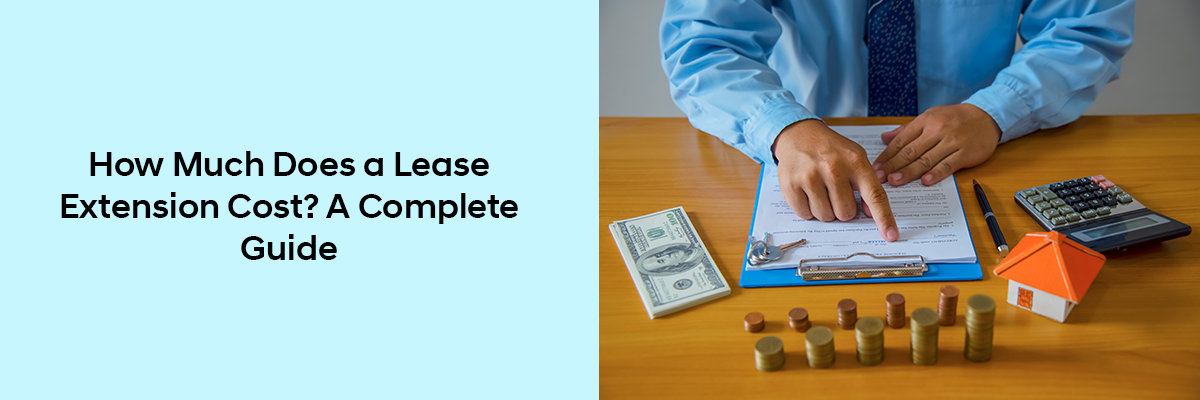Extending the lease on a property is a crucial consideration for homeowners, especially leasehold flat owners in the U.S. and U.K. A lease extension not only protects your long-term investment but also increases property value and salability. However, the process comes with financial implications. So, how much does a lease extension cost? This blog breaks down all the associated costs, factors influencing the total amount, and how to plan financially for a smooth lease extension.



What Is a Lease Extension?
A lease extension is a legal agreement between a leaseholder (typically the owner of a leasehold flat or apartment) and the freeholder (landlord), granting the leaseholder an extended right to occupy the property beyond the current lease term.
In most cases, lease extensions add 90 years to the existing lease for flats and 50 years for houses, depending on jurisdiction and local property laws.
Understand the difference between lease extension vs lease renewal to make the right choice in different scenarios.
Why Extend a Lease?
Before we dive into the costs, let’s understand why it’s important:
- Maintains or increases property value
- Improves mortgageable – Banks prefer long leases
- Avoids ground rent escalation
- Facilitates easier selling of the property
Once a lease drops below 80 years, the cost of extending it increases significantly due to “marriage value” (more on this later).
What Factors Influence Lease Extension Costs?
The cost of a lease extension isn’t fixed and can vary greatly based on several factors:
1. Current Lease Length
- Above 80 years: Usually cheaper, as no marriage value applies.
- Below 80 years: Marriage value kicks in and increases cost significantly.
2. Ground Rent
Higher ground rent means a higher premium to eliminate it in a statutory lease extension.
3. Property Value
The more valuable the property, the higher the lease extension premium.
4. Marriage Value
This is the increase in property value once the lease is extended. If the lease has less than 80 years remaining, the leaseholder must share this value 50/50 with the freeholder.
Let’s see an example, say you own a leasehold flat with the following details:
- Current lease remaining: 75 years (below 80 years)
- Current market value (with short lease): $250,000
- Market value after lease extension (long lease): $280,000
- Ground rent per year: $200
- Value of lease extension premium (before adding marriage value): $12,000
Marriage Value Calculation:
- Increase in value due to extension = $280,000 (after extension) – $250,000 (before extension) = $30,000
- Marriage value = 50% of $30,000 = $15,000
- Total lease extension premium payable = Base premium ($12,000) + Marriage value ($15,000) = $27,000
5. Legal and Professional Fees
These include surveyor and solicitor fees, tribunal costs (if necessary), and potentially the landlord’s legal fees as well.
Breakdown of Lease Extension Costs
Here is a complete breakdown of the potential expenses involved:
1. Premium (Purchase Price)
This is the amount paid to the freeholder to extend the lease. It varies based on the factors mentioned above.
Typical Range: $5,000 to $40,000+ depending on property value and lease term.
2. Valuation Fees
A lease extension valuation by a chartered surveyor is essential to determine a fair premium.
Typical Cost: $500 – $1,500
3. Solicitor Fees
You’ll need legal assistance to handle the notice, negotiation, and legal paperwork.
Typical Cost: $800 – $2,000
4. Freeholder’s Legal and Valuation Fees
Under leasehold law, the leaseholder usually pays for the freeholder’s reasonable legal and valuation costs too.
Typical Cost: $1,000 – $3,000+
5. Land Registry and Tribunal Fees (if needed)
If you need to apply to the Leasehold Valuation Tribunal due to disputes, additional costs apply.
Typical Cost: $100 – $500+ (Land Registry)
Tribunal Costs: Varies if required
Example Calculation
Let’s assume:
- Property value: $300,000
- Lease remaining: 75 years
- Ground rent: $200/year
In this scenario, the lease extension premium could range from $12,000 to $20,000, depending on the valuation. With additional legal and professional fees, the total lease extension cost might reach $16,000 to $25,000.
Statutory vs. Informal Lease Extensions: Cost Implications
Statutory Route
This is the legally protected route (typically available after 2 years of ownership). You get a 90-year extension and ground rent is reduced to zero.
- Costs are more predictable
- Marriage value applies if under 80 years
- Both parties’ legal fees are required
Informal Route
Negotiated directly with the freeholder.
- More flexible terms
- Potentially faster process
- But can include increased ground rent or worse terms
Always have a solicitor review informal offers before agreeing.
To know more about adding new tenant to existing lease, do read our in-depth blog.
Can I Negotiate Lease Extension Costs?
Yes. You can negotiate the premium and terms with the freeholder, particularly in the informal route. However, if negotiations break down, statutory rights and tribunals provide legal backup.
Hiring an experienced lease extension surveyor strengthens your position and helps minimize overpayment.
Tips to Save on Lease Extension Costs
- Act early – Extending before the lease drops below 80 years avoids marriage value.
- Shop around for surveyors and solicitors – Compare quotes and services.
- Negotiate reasonably – Be aware of your rights and have evidence-backed valuation.
- Go statutory if informal terms are unfavorable – You’re protected by law.
Lease Extension and Property Sales
If you’re planning to sell your leasehold flat, a short lease can deter buyers and reduce property value. You can begin the lease extension process and pass the benefit to the buyer, making the property more attractive on the market.
Explore property management webinars and training sessions for real estate, leasing, and housing compliance. Stay ahead in property management and leasehold law with insights from industry experts.
Final Thoughts
Lease extension may seem expensive, but it’s a crucial investment in your property’s future. With escalating costs as leases shorten, the earlier you act, the more you save. Whether you opt for the statutory or informal route, be prepared with the right professionals by your side to ensure a fair deal.
To know more about tenant eviction for property damage, do read our in-depth blog.
Understanding each element of the cost helps you avoid surprises and empowers you to make informed financial decisions.


